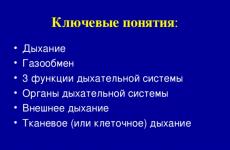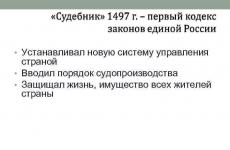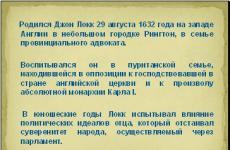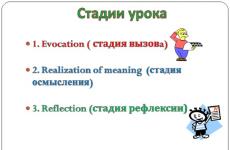John locke short biography presentation. Presentation on the topic: Political teachings of John Locke. Ideas according to J. Locke

He was brought up in a puritanical family that was in opposition to the ruling English church in the country and to the arbitrariness of the absolute monarchy of Charles I.
In his youth, Locke was influenced by the political ideals of his father, who defended the sovereignty of the people through parliament.

1632 John Locke was born in Somerset, England.
- 1642 - The beginning of the civil war in England. Locke's father leaves home to join the supporters of Parliament.
1647-1652 - Studying at the school at Westminster Abbey.
1652 - enters the College of Christ Church in Oxford, where he later becomes a teacher.
1663 - Locke writes, but does not publish, his work "Natural Law".
1665 - Member of the British diplomatic mission in Brandenburg.
1667 - enters the service of Lord Ashley (later - Earl of Shaftesbury).
1668 - Elected a Fellow of the Royal Society, the first great scientific institution.
1675 - takes a trip to France.
1683 - after the accession to the throne of James II, Locke fled to Holland.
- 1689 - after the accession to the throne, William of Orange returns to England. He publishes his work "Experience of Human Understanding".
1691 - retires and moves to live with Lord and Lady Mesham in Essex.
1704 - Death of Locke. He is buried in the church of the village of High Laver.

"Elements of Natural Philosophy",
"Experience of Tolerance",
"Two treatises on government",
"Some Thoughts on Parenting"
the famous treatise "Experience of Human Understanding".
He also published many articles, letters, notes, where questions of economics, politics, ethics, religion, pedagogy are considered. A number of works were published by Locke under false names (he always feared that he might be comprehended by the fate of Algernon of Sydney, who was hanged during the time of Charles II for the fact that in his papers they found the manuscript "Discourse on Government", which defended the theory of social contract).
Similar documents
John Locke as the theorist of materialistic sensationalism of the 17th-18th centuries Characteristics of Locke's biographical data. Locke's doctrine of external and internal experience. Philosopher's "Experience of Human Understanding" as an Explanation of the Whole System of Empirical Philosophy.
abstract, added 01/28/2013
A short biography of the British educator and philosopher D. Locke, the spread of sensationalism and the influence of his ideas on the development of epistemology and political philosophy. The main provisions of Locke's philosophy, his spiritual heritage: "Experience of the human mind", etc.
presentation added on 06/28/2015
Rejection of the existence of the theory of "innate ideas" in the work "Experience of the human mind" by J. Locke. Two types of experience and kinds of knowledge according to Locke, his idea of the separation of powers. Classification of ideas by methods of education and formation, types of complex ideas.
presentation added 09/25/2016
Principles of hereditary power, the position of the king in relation to religion. Natural state and natural law. The principle of the contract in the works of Locke. Locke's views on property. The history of the doctrine of “stops and balances.” The influence of Locke in philosophy.
abstract, added on 08/25/2010
John Locke's "human understanding" experience is one of the most important monuments of 17th century philosophy. Locke's Sensualist Theory of Knowledge: The Proposition on the Experimental Origin of All Human Knowledge. The concept of "sensibility" and "reflection" in knowledge.
abstract, added 02/15/2012
The main features of the empiricism of the philosophy of modern times. Philosophical ideas of Francis Bacon, Gottfried Leibniz, John Locke. F. Bacon's doctrine of "natural" philosophy. D. Locke's work "Experience of the Human Mind". The opposition of empiricism and rationalism.
abstract, added 01/19/2016
John Locke, as one of the most prominent representatives of modern philosophy, the "father" -the founder of European liberalism. Exploring the scientific position of John Locke on revenge and retribution. Locke's criticism of the innate theory of the ideas of Descartes and Leibniz.
article added on 10/26/2018
Brief biographical information about Kant's childhood and adolescence. Influence of the mother on the creative formation of Immanuel. Features of training in the Friedrich gymnasium and the role of A. Schulz in education. Historical and contemporary significance of Kant's philosophy.
abstract, added 09/08/2013
Brief biography and main ideas of J. Locke. Empirical-sensualistic theory of knowledge, the role of education in the formation of personality. Gentleman education system. Foundations of the rule of law, the principle of separation of powers. The role of religion, the idea of tolerance.
presentation added on 02/08/2016
Brief biographical information about the childhood and adolescence of I. Kant. His teaching and doctoral dissertation defense. The essence of space and time as philosophical categories. Characteristics of Kant's "Critique of Pure Reason". Features of the principle of self-worth of personality.
Slide 1
Slide Description:
Slide 2
Slide Description:
Slide 3
Slide Description:
Slide 4
Slide Description:
Slide 5
Slide Description:
Locke's main philosophical work is The Experience of the Human Mind. Locke continued the development of Bacon's empiricism, substantiating the sensationalist direction (a direction that recognizes sensations, perceptions as the only source of knowledge) in the theory of knowledge. Locke believed that knowledge comes from experience, and experience comes from sensations. Locke's main philosophical work is The Experience of the Human Mind. Locke continued the development of Bacon's empiricism, substantiating the sensationalist direction (a direction that recognizes sensations, perceptions as the only source of knowledge) in the theory of knowledge. Locke believed that knowledge comes from experience, and experience comes from sensations. Locke's theory stated: 1) there are no innate ideas, all knowledge is born in experience; 2) the soul or mind of a person at birth is like a blank slate; 3) there is nothing in the intellect that was not previously in sensations, in feelings.
Slide 6
Slide Description:
Locke criticized Descartes' doctrine of "innate" ideas. The sensations received by a person from his environment, according to Locke, are the first and decisive foundation of all knowledge. Locke divides experience into two types: external experience (sensations) and internal (reflection). The source of the first is the objective material world, which affects our senses and evokes sensations. Internal experience, through reflection, is directed to the observation of their own observations.
Slide 7
Slide Description:
Slide 8
Slide Description:
Slide 9
Slide Description:
The following basic provisions of John Locke's philosophy can be distinguished: the world is materialistic; cognition can only be based on experience ("there is nothing in the thoughts (mind) of a person, which was not previously in the feelings"); consciousness - an empty cabinet, which is filled with experience throughout life (in this regard, Locke's world-famous statement about consciousness as a "blank board" on which experience is written - tabula rasa); the source of experience is the outside world; the goal of philosophy is to help a person achieve success in their activities; the ideal of a person is a calm, law-abiding, respectable gentleman who improves his level of education and achieves good results in his profession; the ideal of the state is a state built on the basis of the division of powers into legislative, executive (including judicial) and federal (foreign policy). Locke was the first to put forward this idea, and this is his great merit.
Slide 10
Slide 1
Slide Description:
Slide 2
Slide Description:
Slide 3
Slide Description:
Slide 4
Slide Description:
Slide 5
Slide Description:
Locke's main philosophical work is The Experience of the Human Mind. Locke continued the development of Bacon's empiricism, substantiating the sensationalist direction (a direction that recognizes sensations, perceptions as the only source of knowledge) in the theory of knowledge. Locke believed that knowledge comes from experience, and experience comes from sensations. Locke's main philosophical work is The Experience of the Human Mind. Locke continued the development of Bacon's empiricism, substantiating the sensationalist direction (a direction that recognizes sensations, perceptions as the only source of knowledge) in the theory of knowledge. Locke believed that knowledge comes from experience, and experience comes from sensations. Locke's theory stated: 1) there are no innate ideas, all knowledge is born in experience; 2) the soul or mind of a person at birth is like a blank slate; 3) there is nothing in the intellect that was not previously in sensations, in feelings.
Slide 6
Slide Description:
Locke criticized Descartes' doctrine of "innate" ideas. The sensations received by a person from his environment, according to Locke, are the first and decisive foundation of all knowledge. Locke divides experience into two types: external experience (sensations) and internal (reflection). The source of the first is the objective material world, which affects our senses and evokes sensations. Internal experience, through reflection, is directed to the observation of their own observations.
Slide 7
Slide Description:
Slide 8
Slide Description:
Slide 9
Slide Description:
The following basic provisions of John Locke's philosophy can be distinguished: the world is materialistic; cognition can only be based on experience ("there is nothing in the thoughts (mind) of a person, which was not previously in the feelings"); consciousness - an empty cabinet, which is filled with experience throughout life (in this regard, Locke's world-famous statement about consciousness as a "blank board" on which experience is written - tabula rasa); the source of experience is the outside world; the goal of philosophy is to help a person achieve success in their activities; the ideal of a person is a calm, law-abiding, respectable gentleman who improves his level of education and achieves good results in his profession; the ideal of the state is a state built on the basis of the division of powers into legislative, executive (including judicial) and federal (foreign policy). Locke was the first to put forward this idea, and this is his great merit.
Slide 10
Slide Description:
Performed:1st year student
Faculty of Management and Marketing
specialties 073
groups 6.03.073.010.17.1
Mikhailova E.S.
Checked:
candidate of social sciences, associate professor
Zherebyatnikova I.V.
Kharkiv 2017 The purpose of my work:
To acquaint students with an English teacher and
philosopher John Locke, his philosophical
ideas. To convey an important role and contribution to the global
the culture of an outstanding philosopher.
Plan: 1. Brief biography of the philosopher. 2. Philosophical doctrine of Locke. 3. Major philosophical works. 4. Philosophy of knowledge. 5.
short biography
OutstandingEnglish philosopher,
teacher, scientist, doctor and
the politician was born in
family of wealthy
a lawyer. John Locke
graduated from Oxford
university where
later became a professor
Greek and
rhetoric.
Fig. 1 Oxford University
short biography
Significantphilosophical
achievement
philosopher was his
the doctrine of knowledge,
to whom he dedicated
its main
work:
"Essays on
the human mind. "
Locke's philosophical teaching
embodiedthe main features of the philosophy of modern times:
opposition to scholasticism, orientation
knowledge to connect with practice.
The goal of his philosophy is man and his
practical life, which found its expression in
Lockean concepts of education and social
the structure of society. The purpose of philosophy is
saw in developing the means to achieve
a man of happiness.
Locke developed based on sensual
perceptions the source of knowledge and systematized
empiricism of modern times.
Major philosophical works
"Two treatises on government""Experiments on the law of nature"
"Letters of Tolerance"
"Thoughts on education"
Philosophy of knowledge
Locke considers the main instrument of knowledge to be reason,who “puts a person above the rest
sentient beings. "
Philosophy subject english thinker
sees
before
Total
v
research
patterns
human
understanding.
Determine the capabilities of the human mind, and,
accordingly, determine those areas that
act as natural limits
human knowledge by virtue of its very
structure means to direct human efforts to
solution
real
problems,
related
With
practice.
Philosophy of knowledge
The only object of human thoughtis the idea. Unlike Descartes, who stood on
position of "innate ideas", Locke argues that
without exception, all ideas, concepts and principles (how
private and general), which we find in
human mind, originate in experience, and in
as one of the most important sources of them are
sensory impressions. Such an educational
the attitude was called sensationalism.
Sensualism - a direction in theory
knowledge, according to which sensations and
perception is the main and main form
reliable knowledge.
Philosophy of knowledge
Fundamental to all empiricalphilosophy, the idea that experience is so
inseparable limit of all possible
knowledge.
Experience consists of external and internal:
1) we sense material objects
2) we perceive the activity of our mind,
movement of our thoughts.
Our knowledge can extend so far
how much experience allows us
Philosophy of knowledge
IDEASSimple
Simple ideas serve
material of all our
knowledge; they are formed
through sensations and
reflections. From
connecting sensation with
reflection arise
simple sensual ideas
reflection, for example,
pleasure, pain, strength and
dr.
Complex
Feelings give impetus first
to the birth of single
ideas, and, as
the mind is mastered with them,
they fit in memory.
Accordingly, complex
ideas arise when
simple ideas take on
higher level for
human account
mind. Lokk became one of the founders of the "Contractual"
theory of the origin of the state.
John Locke is named after one of the key
characters of the cult television series "Stay in
alive. "
Also, Locke took the surname as a pseudonym
one of the heroes of the cycle of science fiction novels
Orson Scott Card's Ender's Game. In Russian
translated English name "Locke" is incorrect
referred to as "Loki".
The surname Locke is the main character in the film.
Michelangelo Antonioni "Profession: Reporter"
1975 and the protagonist of the 2013 film of the same name
year of release (directed by Stephen Knight) performed by Tom
Hardy.
Literature:
1. Blaug M. Locke, John // 100 Great Economists before Keynes =Great Economists before Keynes: An introduction to the lives & works of
one hundred great economists of the past. - SPb .: Economikus, 2008.
- S. 175-177. - 352 p. - (Library of the "School of Economics", vol.
42). - 1,500 copies - ISBN 978-5-903816-01-9.
2. Zaichenko G. A. Objectivity of sensory knowledge: Locke,
Berkeley and the problem of "secondary" qualities // Philosophical sciences. -
1985. - No. 4. - S. 98-109.
3. Locke, John // Brockhaus and Efron Encyclopedic Dictionary:
in 86 volumes (82 volumes and 4 additional). - SPb., 1890-1907.
Locke John / Subbotin A.L. // Kuna - Lomami. - M.: Soviet
encyclopedia, 1973. - (Great Soviet encyclopedia: [in 30 volumes] /
ch. ed. A. M. Prokhorov; 1969-1978, vol. 14).
4. Nureyev RM Theoretical foundations of criticism of mercantilism.
J. Locke // World History of Economic Thought: In 6 volumes /
Ch. ed. V.N. Cherkovets. - M .: Thought, 1987. - T. I. From the birth
economic thought before the first theoretical systems
political life. - S. 414-418. - 606 p. - 20,000 copies. - ISBN 5244-00038-1.






